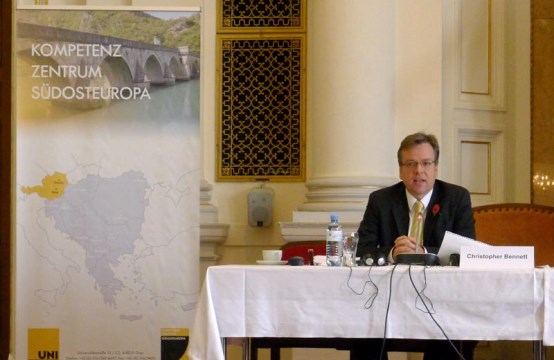A journalist and academic whose writing on the Balkans began with him breaking news of war in Slovenia on the front page of The Daily Telegraph has been appointed as an Honorary Professor of History at De Montfort University Leicester (DMU).

Chris Bennett has written extensively about the Balkans since bringing the Wars of Yugoslav Dissolution to UK attention from 1991 onwards, and says he is honoured to be joining DMU.
“It is an enterprising institution eager to move with the times and provide relevant education for the 21st century”, he said.
Chris, who lives in Sarajevo, the capital of Bosnia and Herzegovina, with his wife and two children, plans to use his position as honorary professor to not only give lectures in DMU's History department, but also open up new areas of research.
He hopes this will include tackling the question of the missing in relation to conflict in the former Yugoslavia and changing international policy towards Bosnia, which has struggled to return to any form of normality in the past 20 years.
Chris would also like to incorporate travel to Sarajevo as part of the #DMUglobal scheme – an initiative designed to offer students international experiences – so students can better understand the history of Bosnia and the peace processes that have failed to heal a nation whose name is synonymous with ethnic division and genocide.
Chris recently completed the book "Bosnia's Paralysed Peace", which is being published by Hurst in the UK and Oxford University Press in the United States. It is his second major publication after "Yugoslavia's Bloody Collapse" (Hurst and New York University Press).
He started out as a reporter, which included a month of training at the Leicester Mercury, and the day after his last exam in 1991 he flew to Ljubljana to write for the Daily Telegraph, days before independence declarations were made.
The first article he wrote was headed “Tanks ready to roll”. A day later Chris made front-page news after reporting that war had broken out.
Chris’s role as a journalist put his life in danger – he and his wife experienced the first battle of the war in Croatia during which their car was destroyed and another journalist was killed. He left the war zone and was one of the first cohort of journalists at Bloomberg Business News in London before joining the Mail on Sunday as a business reporter.
Chris returned to Bosnia in 1995 after a peace agreement was put in place, to work for a start-up organisation called the International Crisis Group, producing analysis of the peace process. He eventually became director of an expanded Balkan project, producing academic-quality work to influence international policy towards the region.
In 1999, Chris was given a fellowship to write a book on the peace process, which was to be managed by the Institute for War and Peace Reporting (IWPR).
Chris explains: “In return, I was expected to edit a new internet news service called the Balkan Crisis Reports for one day a week. It was, however, the time of the Kosovo campaign. I, therefore, ended up working seven days a week, building a news service on the basis of a network of local writers. The information that they could produce proved invaluable when no media organisations had access to Kosovo and even Serbia. In this way, IWPR took off as a news organisation. We won the first Netmedia award for the best overall news service, ahead even of BBC online for our coverage of Kosovo. And we then expanded the service to cover the Caucasus and former Soviet Central Asia.
“Although I left in May 2000 to join NATO, IWPR has gone from strength to strength and now covers most crisis areas of the world on the basis of networks of local journalists.”
Chris’s interest in Yugoslavia came from him being half Slovene – his mother was raised there – and he incorporated travel and study around the former Yugoslavia into his early adult life, mastering the languages and embracing the culture.
His passion for rebuilding Bosnia included helping to organise for gold medal-winning ice dance duo Torville and Dean to return to Sarajevo, where they won their Olympic medal 30 years earlier, to perform their Bolero routine one last time.
DMU academic Dr Kenneth Morrison, Reader in Modern Southeast European History and an internationally-renowned expert on the state of the former Yugoslavia, welcomed Chris to the university, saying: “We're absolutely delighted to have Chris join us as part of the History team at DMU. It's a great boost for us to have someone with his expertise on Southeast Europe and his experience of working for international organisations. We're looking forward to working on a number of exciting joint initiatives in the coming months and years."
Posted on Monday 11 January 2016